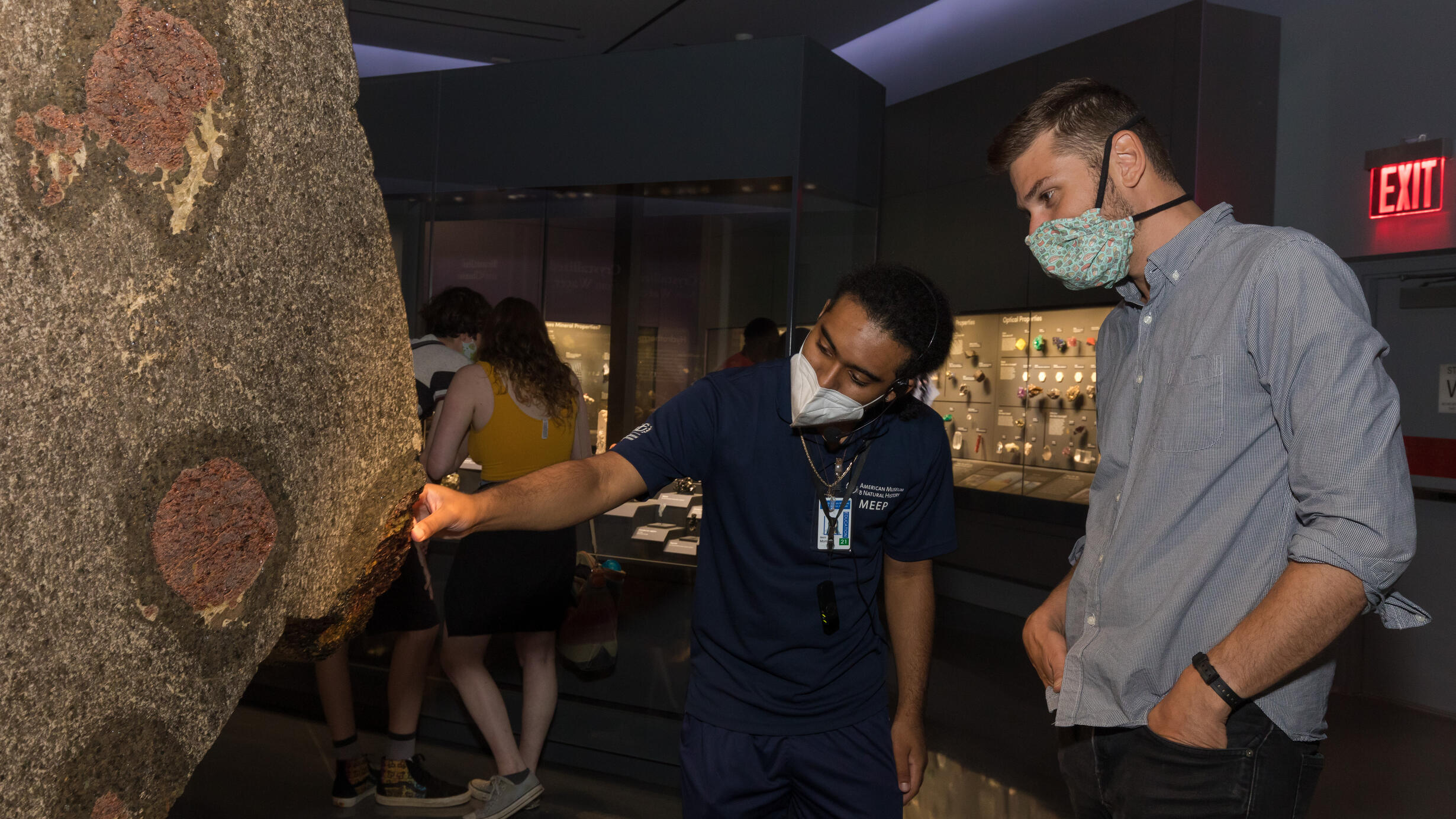Next Generation Museum Conversations
 M. Shanley
M. Shanley In 2019, the American Museum of Natural History received a grant from the Institute of Museum and Library Services (IMLS). The IMLS-Next Generation Museum Conversations Grant aims to develop and pilot a new facilitation and visitor engagement strategy that reflects current standards and research on science education and learning. The project will shift the training of its diverse cohort of college youth facilitators to prepare them to engage visitors in a deeper understanding of science, rather than simply conveying facts.
Utilizing the displays, objects, and exhibits in the newly renovated Allison and Roberto Mignone Halls of Gems and Minerals, 30 New York City undergraduate college students from the City University of New York will participate in a newly designed floor facilitation curriculum built upon the Museum Education and Employment Program (MEEP) that integrates the Next Generation Science Standards and informal science pedagogical approaches to focus on familial engagement in the halls.
Project Partners
- City University of New York—John Jay College of Criminal Justice
- University of Pittsburgh Center for Learning in Out-of-School Environments (UPCLOSE)
Project Timeline
The Next Generation Museum Conversation project extends through Spring of 2022 with three cohorts of students from John Jay College of Criminal Justice. Each cohort will consist of 10 students working 150 total hours over a semester.
Cohort 1-10 students
- June 2021—Facilitation Training
- July–August—Facilitation in Mignone Halls of Gems and Minerals
Cohort 2-10 students
- September/October 2021—Facilitation Training
- November–January 2022—Facilitation in Hall of Gems and Minerals
Cohort 3-10 students
- January/February—Facilitation Training
- March–May 2022—Facilitation in Mignone Halls of Gems and Minerals
This project has several guiding research questions focused on family experience and learning as well as the impact of museum work on facilitators.
1. Impact on Family Learning On-Site: How does the new facilitator training impact on-the-floor family interactions and learning about topics relevant to the new Mignone Halls of Gems and Minerals?
- Which big ideas in the exhibition do families find most compelling?
- What are families learning about the big ideas as a result of the facilitated experience?
- Do families feel that the facilitation helped them make connections between their existing understanding of the content and advancing their understanding and interest in learning more?
- To what extent are families able to transfer the practices they engaged in with the facilitator to other exhibits in the Mignone Halls of Gems and Minerals?
2. Impact on Family’s Overall Visitor Experience: How is the visitor experience altered for families as a result of interacting with facilitators?
- How do visitors describe their Museum experience after a 3-month period and does interaction with a facilitator play a role in that experience?
3. Impact on Facilitators: How does participation in the new training impact how facilitators think about their competencies related to the communication of complex science ideas?
- Are facilitators able to learn how to facilitate productive conversations with families through the new training?
- Does engaging families in practices of science impact how facilitators think about the process of doing science?
- In what ways does the experience impact facilitators’ career interests?
Data Collection Methods
To address research questions 1 and 2, we will use a combination of family surveys, videotapes of family interactions with MEEP facilitators, and post-visit interviews. To address research question 3, we will use pre-post surveys, field observations, and exit tickets.
Implications
We expect that this project will inform our own practices on youth floor facilitation as well as offer us insight into family learning. We will also surface new questions for ourselves and for the field. We look forward to sharing our training model and findings throughout the project.
Credit
Museum Education and Employment Program (MEEP)
The Museum Education and Employment Program is generously supported by the Institute of Museum and Library Services under grant number MA-10-19-0593-19.
Additional support has been provided by a gift from the Michael Levandowsky Living Trust.
The Museum’s Education Collection is generously supported by the Anna-Maria and Stephen Kellen Foundation.
Renovation of the Halls of Gems and Minerals/the Allison and Roberto Mignone Halls of Gems and Minerals
The Museum gratefully acknowledges Allison and Roberto Mignone for their leadership support of the redesigned Halls of Gems and Minerals.
Generous support has been provided by Melissa and Keith Meister, the Arthur Ross Foundation, Kenneth C. Griffin, and David Yurman.
Additional support has been provided by the John & Amy Griffin Foundation and the City of New York.